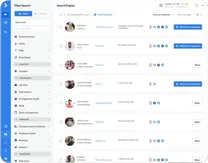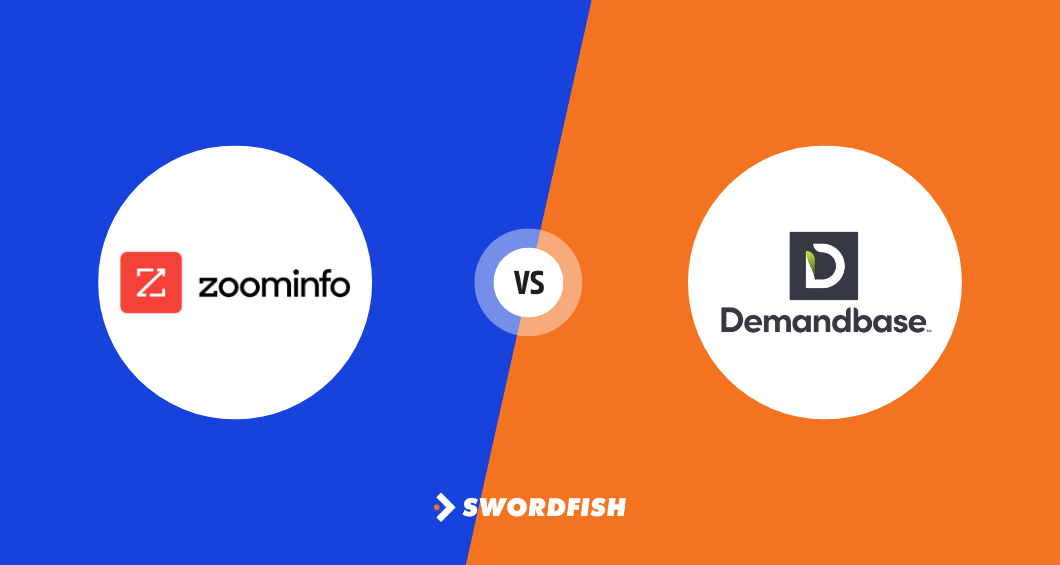
Are you trying to decide between ZoomInfo and Demandbase for your business intelligence needs? Choosing the right tool can be critical for your marketing and inside sales strategies. Both ZoomInfo and Demandbase are popular choices, but they serve different purposes.
- ZoomInfo: Best for in-depth B2B contact databases and detailed market research.
- Demandbase: Ideal for targeted Account-Based Marketing (ABM) strategies.
While these tools have distinct strengths, the decision isn’t always straightforward. There’s more to consider than just their primary functions. That’s why, we’ll dive deeper into the ZoomInfo vs Demandbase debate.
Along with that, we’ll explore what makes them unique and how they can help your business
Key Takeaways
- Core Differences: ZoomInfo is known for its vast B2B contact databases, providing deep insights into businesses and their contacts. Meanwhile, Demandbase stands out with its emphasis on Account-Based Marketing (ABM) and B2B ads, using AI to sharpen its marketing and sales insights.
- Ideal For: ZoomInfo is a great fit for sales and marketing experts who need detailed contact and company info for generating leads and conducting market research. Demandbase is more suited for companies keen on ABM, offering sophisticated tools for specific advertising and sales insights.
- Pricing: ZoomInfo’s pricing varies, typically customized to a company’s size and needs, usually requiring a direct inquiry for precise pricing. Demandbase, however, provides various pricing plans, including a calculator on their site for clearer, customized pricing options.
- Swordfish AI as the Best Alternative: Those looking for Demandbase and ZoomInfo alternatives will find Swordfish AI an attractive choice. It’s known for delivering precise contact details, like phone numbers and emails, ensuring accuracy and direct connection to key decision-makers.
ZoomInfo vs Demandbase: A Quick Comparison Table
Selecting the right B2B intelligence platform requires knowing what each one does best. ZoomInfo and Demandbase are top choices in this field, each with its own special features suited for different business needs.
Here’s a straightforward comparison to guide you in choosing the one that fits your business goals.
|
Features |
ZoomInfo |
Demandbase |
|
Core Focus |
B2B Contact Databases | Account-Based Marketing (ABM) |
| Ideal For | Sales & Marketing Professionals |
Businesses Implementing ABM Strategies |
|
Data Collection |
Extensive Data on Business Contacts | AI-Driven Insights for Targeted Marketing |
| Database | Over 135 million verified phone numbers, and 260 million professional profiles |
Over 150 million B2B contacts, and 92 million companies |
|
Pricing Model |
Customized Based on Business Size & Needs | Various Options with Transparent Pricing |
| Key Strength | In-depth Contact Details & Company Information |
Advanced Tools for Targeted Advertising & Sales Intelligence |
|
User Interface |
User-Friendly with Efficient Data Access | Intuitive, Focused on Marketing Automation |
| Integration | Smooth Integration with Pipedrive, Zoho, Salesforce, HubSpot, and Dynamics 365. |
Broad Integration with Marketo, HubSpot, DRIFT, QUALIFIED, and Salesforce. |
|
Customer Support |
Strong Support & Training Resources | Dedicated Support with ABM Focus |
| Analytics & Reporting | Detailed Reporting on Market Research |
Advanced Analytics for Account Engagement |
ZoomInfo vs Demandbase: In-depth Key Differences
As far as business intelligence and B2B lead generation tools go, ZoomInfo and Demandbase are the best. There are, however, different needs and strategies for them. We’re comparing the two, starting with lead generation, data validation, and pricing.
1. Lead Generation and Management
When it comes to lead generation and management, both ZoomInfo and Demandbase offer unique features and approaches. Here’s a detailed comparison to help you understand how each platform serves your business needs in this area.
|
Features |
ZoomInfo |
Demandbase |
|
B2B or B2C Focus |
Primarily B2B | Primarily B2B, with strong ABM features |
| Data Sources and Quality | Extensive database with high-quality, verified B2B data |
AI-driven insights from a variety of B2B data sources |
|
Customizable Filtering and Segmentation |
Advanced filtering options for targeted lead generation | Dynamic segmentation capabilities tailored for ABM strategies |
| Integrations with CRM and API | Wide range of integrations with Marketo, HubSpot, DRIFT, QUALIFIED, and Salesforce, etc. |
Easy integration with Pipedrive, Zoho, Salesforce, HubSpot, and Dynamics 365, etc. |
Although you know how they compare, it is time to take a deeper look at each of them in order to get a better understanding.
B2B or B2C Focus
ZoomInfo targets B2B businesses with a vast database of company and contact details. Meanwhile, Demandbase focuses on B2B through Account-Based Marketing (ABM).
ZoomInfo:
ZoomInfo is mainly for B2B businesses, offering a large database useful for finding detailed information about companies and contacts. It’s great for improving B2B sales and marketing.
Demandbase :
In contrast, Demandbase also targets B2B companies but focuses on Account-Based Marketing (ABM). This approach is better for companies wanting targeted marketing and sales efforts, not general B2C marketing.
Data Sources and Quality
ZoomInfo provides regularly updated, reliable B2B data from various sources. On the other hand, Demandbase uses AI for insightful B2B data analysis for ABM.
ZoomInfo:
ZoomInfo is known for its reliable and regularly updated B2B data, gathered from many different sources. This extensive database is regularly updated, ensuring accuracy and relevance, which is often highlighted in ZoomInfo reviews.
Demandbase :
On the other side, Demandbase, competing in the same space, uses AI to analyze various B2B data sources. This method offers detailed and smart insights, making the data useful for ABM strategies.
Customizable Filtering and Segmentation
ZoomInfo offers detailed filtering for targeted market segments. In contrast, Demandbase excels in dynamic segmentation for effective ABM.
ZoomInfo:
ZoomInfo has detailed filtering options, allowing businesses to target specific market areas. This is perfect for companies wanting to focus on particular market segments.
Demandbase :
Demandbase is strong in creating dynamic market segments, a key part of ABM. This lets companies customize their marketing to specific accounts, making their campaigns more effective.
Integrations with CRM and API
ZoomInfo offers extensive CRM integrations and strong API support for efficient data sync. Meanwhile, Demandbase smoothly integrates with CRMs and provides a tailored API.
ZoomInfo:
ZoomInfo provides a wide range of integrations with popular CRM systems, along with strong API support. This integration enables smooth data synchronization and workflow automation, improving overall efficiency.
Demandbase :
Similarly, Demandbase integrates smoothly with major CRM systems and provides an API for tailored solutions. This makes it easy for businesses to add Demandbase’s insights into their existing systems, useful for various marketing and sales needs.
Does ZoomInfo Provide Better Lead Generation and Management Than Demandbase?
- ZoomInfo: If your focus is on accessing a broad B2B database with detailed filtering options for direct lead generation, ZoomInfo is the better choice. It’s ideal for businesses aiming to target specific market segments.
- Demandbase: For companies prioritizing Account-Based Marketing (ABM) and seeking AI-driven insights for targeted marketing strategies, Demandbase stands out as the more suitable option.
2. Data Validation and Real-time Updates
As B2B marketing and sales change rapidly, having accurate and up-to-date data is key. ZoomInfo and Demandbase both provide this, but their methods differ.
Here’s a straightforward comparison of how they perform in lead scoring, website visitor tracking, and real-time data updates.
|
Features |
ZoomInfo | Demandbase |
| Lead Scoring | Uses detailed methods to rank leads based on how accurate and relevant the data is |
Employs AI to score leads, especially considering account-based marketing needs |
|
Website Visitor Tracking |
Can pinpoint who’s visiting your site, providing comprehensive contact and company info | AI technology is used to identify and rank visitors, focusing on the importance of their accounts |
| Real-time Data Updates | Regularly refreshes its database to ensure information is current |
Offers up-to-the-minute insights, especially on account activities and interactions |
Now let’s look deeper at how these features actually work and how they can help your business.
Lead Scoring
ZoomInfo examines leads using complex methods for accuracy and relevance. On the other hand, Demandbase uses AI for lead evaluation, aiding account-based marketing.
ZoomInfo:
ZoomInfo uses complex methods to evaluate leads, focusing on how accurate and relevant the data is. It ensures that the leads provided are reliable and well-ranked.
Demandbase :
Demandbase, in comparison, uses AI to evaluate leads, incorporating strategies for account-based marketing. This is especially useful for businesses that focus on targeting specific accounts since it gives a deeper understanding of their potential.
Website Visitor Tracking
ZoomInfo identifies website visitors with detailed company and contact info. Then again, Demandbase uses AI to sort visitors based on account importance for ABM.
ZoomInfo:
ZoomInfo is great at figuring out who is visiting your website by providing detailed information about the company and the contacts. This is really helpful for businesses that want to know more about their website visitors.
Demandbase:
Demandbase, on the other hand, uses AI to figure out which visitors are most important based on their accounts. It’s ideal for companies that use account-based marketing, as it helps them focus on the most valuable visitors.
Real-time Data Updates
ZoomInfo constantly updates its database for accurate, relevant data. Meanwhile, Demandbase focuses on real-time account engagement insights for ABM.
ZoomInfo:
ZoomInfo is known for keeping its data up-to-date, and constantly refreshing its database. This is important for making sure the data stays accurate and relevant.
Demandbase:
Demandbase also provides up-to-date insights but puts more focus on what’s happening with accounts and how they engage. Businesses with account-based marketing strategies will particularly benefit from this, as it provides updates on important accounts.
Should You Choose ZoomInfo or Demandbase for Data Validation and Real Time Updates?
ZoomInfo: Ideal for businesses needing up-to-date, precise data and insights into who visits their website. ZoomInfo stands out for its ability to provide current and detailed lead and visitor information.
Demandbase: Best suited for those focusing on account-based marketing. Demandbase uses AI effectively to assess leads and identify key website visitors, delivering key information for targeting particular accounts.
3. Convenience and Support
Choosing the right B2B intelligence tool involves looking at user-friendliness, customer support, and legal compliance. ZoomInfo and Demandbase both shine in these areas but in different ways. Let’s see how they stack up.
|
Features |
ZoomInfo | Demandbase |
| Ease of Use | Easy to use, with a straightforward interface for quick data access |
User-friendly, particularly for ABM, but might need some time to get used to |
|
Customer Support |
Offers extensive help and training, praised by users | Provides focused support for ABM, with tailored help and resources |
| Compliance with Laws | Complies with the Swiss-U.S. Privacy Shield Framework and EU-US Privacy Shield Framework. |
Sticks to GDPR, focusing on ethical data sourcing and privacy. |
Now let’s look at them closely based on what we’ve already discussed.
User-Friendliness
ZoomInfo offers a straightforward interface for easy data access, ideal for hassle-free use. Meanwhile, Demandbase is intuitive but tailored for ABM strategies.
ZoomInfo:
ZoomInfo is known for its straightforward interface, making it easy for users to find and access data quickly. It’s a great option for those who appreciate a hassle-free and efficient experience.
Demandbase:
Demandbase, while also intuitive, is specifically designed for Account-Based Marketing (ABM) strategies. New users might need some time to get used to its unique features.
Support Services
ZoomInfo is known for extensive support and training, praised for its responsive team. Meanwhile, Demandbase provides specialized support for ABM-focused businesses.
ZoomInfo:
ZoomInfo is recognized for its extensive support and training, with many users praising its responsive and helpful team. It’s a solid choice for consistent support.
Demandbase:
Demandbase, in contrast, provides its support to ABM, providing specialized assistance and resources. This targeted support is especially useful for businesses focused on ABM.
Legal Compliance
ZoomInfo adheres to Swiss-U.S. and EU-US Privacy Shield Frameworks, ensuring data ethics. Likewise, Demandbase complies with GDPR, focusing on ethical data sourcing and privacy.
ZoomInfo:
ZoomInfo strongly adheres to data privacy laws the Swiss-U.S. Privacy Shield Framework and EU-US Privacy Shield Framework. This makes it a reliable option for businesses concerned about data ethics.
Demandbase:
Demandbase also prioritizes legal compliance GDPR, focusing on ethical data sourcing and privacy standards. It’s essential for companies that value ethical data practices.
Which One Provides Better User Convenience And Support: ZoomInfo or Demandbase?
- ZoomInfo: Ideal if you’re looking for an easy-to-use interface with quick data access and value extensive customer support. It’s a strong choice for those seeking straightforward usability and responsive help.
- Demandbase: Better suited for businesses focused on Account-Based Marketing (ABM), offering resources and support geared towards ABM. Opt for Demandbase if your priority is a platform designed for ABM with dedicated assistance in this area.
4. Pricing and Scalability
Selecting the right B2B intelligence tool involves careful consideration of cost and the ability to adapt to your business’s growth.
Here’s a straightforward look at how ZoomInfo and Demandbase stack up in terms of their pricing, trial options, and ability to scale with your business.
|
Features |
ZoomInfo | Demandbase |
| Pricing and Plans | Has various plans, details provided on request |
Uses an online calculator for tailored pricing based on your business size and needs |
|
Free Trial |
Free trial details not openly advertised, contact their sales for info | Typically doesn’t offer a free trial, focuses on custom solutions for businesses |
| Scalability | Suits a wide range of business sizes, offering diverse features and integrations |
Built to grow with your business, particularly for those focusing on large-scale ABM and marketing |
Since it’s vital to understand how pricing and scalability can impact your business choice, we’ll break down everything.
Pricing and Plans
ZoomInfo offers various pricing plans, with details available upon contact. Meanwhile, Demandbase uses an online calculator for personalized pricing estimates.
ZoomInfo Pricing:
It has various pricing options to suit different business needs. However, you need to contact their sales team to get specific ZoomInfo Pricing details. This method allows ZoomInfo to offer plans that match your business’s unique needs.
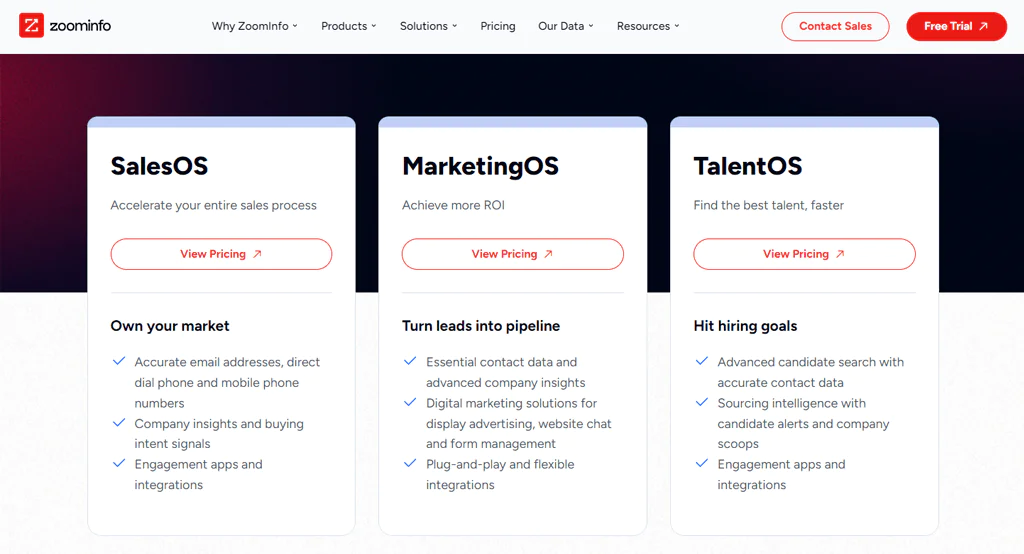
Demandbase Pricing:
Demandbase, also offers customized pricing plans. However, it uses an online calculator for pricing which is a plus for you. This feature helps businesses get a personalized cost estimate based on their size and requirements, providing clarity on expenses without needing initial contact.
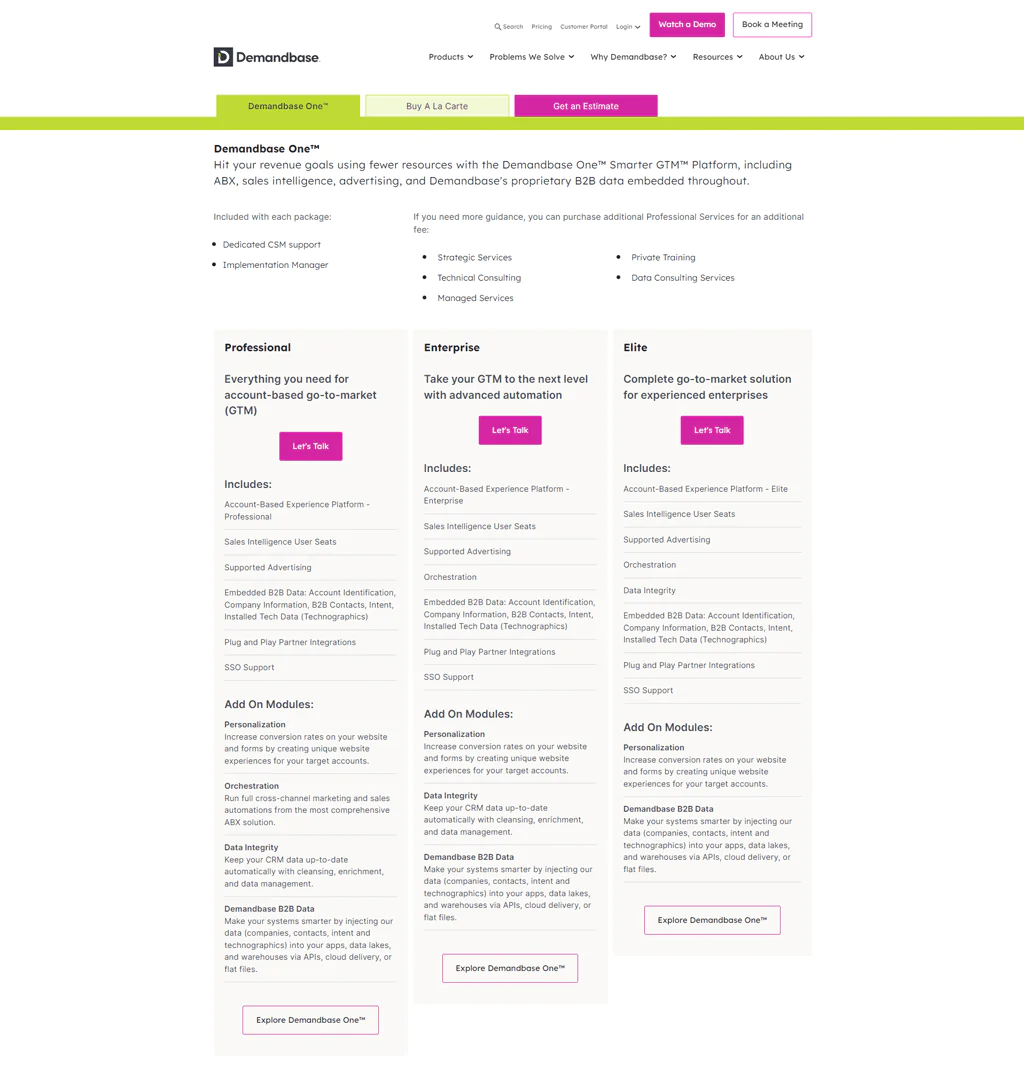
Free Trial
ZoomInfo provides a free trial, but details require contacting their sales team. However, Demandbase typically doesn’t offer a free trial, focusing on custom solutions.
ZoomInfo:
ZoomInfo offers a free trial however, you have to contact their sales team to find out. This could be inconvenient for businesses wanting to try the service first.
Demandbase:
Demandbase generally doesn’t provide a free trial, focusing more on creating custom solutions for each business. While this shows their commitment to tailored service, it might limit the chance to test their platform before making a decision.
Scalability
ZoomInfo supports businesses of all sizes with various features and integrations. Meanwhile, Demandbase is scalable, and ideal for ABM and large campaigns.
ZoomInfo:
ZoomInfo is built to accommodate businesses of all sizes, offering a range of features and integrations. This makes it a flexible option for growing businesses.
Demandbase:
Demandbase is also scalable, particularly for companies focusing on Account-Based Marketing (ABM) or large marketing campaigns. It’s designed to meet the evolving needs of larger businesses or those concentrating on ABM.
Which One is Affordable and Flexible Between ZoomInfo and Demandbase?
- ZoomInfo: Choose ZoomInfo if you’re looking for a platform that can tailor its pricing to your unique business requirements. It’s ideal for businesses of all sizes, offering a range of features and integrations, making it a versatile choice for growth and scalability.
- Demandbase: Opt for Demandbase if your business focuses on Account-Based Marketing (ABM) or large marketing campaigns. Its online pricing calculator provides clear cost estimates, offering businesses upfront pricing transparency and scalability.
5. Limitations
When comparing B2B intelligence platforms like ZoomInfo and Demandbase, it’s key to consider their limitations as well as their strengths. Here’s a simplified breakdown of the main limitations for each tool.
ZoomInfo:
- Clear Pricing: Getting detailed pricing from ZoomInfo requires talking to their sales team, which might not be ideal for everyone.
- Trial Option: ZoomInfo doesn’t clearly advertise a free trial, making it hard for companies to try it out before buying.
- Too Much Data: For some, especially new users, ZoomInfo’s vast database can be a bit too much to handle.
Demandbase :
- Ease of Use: If you’re new to Account-Based Marketing (ABM), Demandbase might take some time to get used to.
- Free Trial: Demandbase usually doesn’t have a free trial, so you can’t test it before you commit.
- Focus on ABM: Demandbase is heavily focused on ABM, which may not suit businesses looking for broader marketing tools.
6. Reviews
Take a look at ZoomInfo reviews and Demandbase reviews on the biggest platforms, where users leave their honest feedback.
ZoomInfo Reviews
- G2: 4.4 · 7,867 reviews
- Capterra: 4.1 · 279 reviews
“Zoominfo makes it easy to find target prospect accounts and key decision-makers within them. The contact info is accurate 99% of the time, making it simple to reach the right people with the right message at the right time. The integrations with Salesforce, LinkedIn Sales Navigator, and other tools mean that data stays clean, consistent – and most importantly – saves me time, which I can use to focus on selling. 10/10” – David T.
Demandbase Reviews
- G2: 4.3 · 1,555 reviews
- Capterra: 4.3 · 16 reviews
“DemandBase is easy to use and has some great reporting features to measure trend over time for your target accounts.” – erin O.
ZoomInfo vs Demandbase: Insights from Reddit
This ZoomInfo and Demandbase comparison is drawn from Reddit user experiences. And it aims to clarify how each tool serves businesses of various sizes and budgets.
Knowing what each platform offers and its limitations is key to making the right choice.
ZoomInfo
ZoomInfo is well-regarded for its vast database and detailed contact info, making it a strong choice for B2B sales and marketing. Reddit users note its easy-to-use interface and quick data access, which are great for big companies with significant sales and marketing demands.
However, some point out ZoomInfo’s pricing isn’t very transparent and the amount of data can be overwhelming. It’s generally viewed as a powerful option for businesses needing deep contact and company details, particularly those ready to invest heavily in lead generation.
Demandbase
Demandbase stands out for its focus on Account-Based Marketing (ABM). According to Reddit users, it works well for businesses targeting specific marketing and sales strategies. Users like its AI-driven insights and the ability to segment markets dynamically.
But, it can be a bit complex for newcomers, especially those not used to ABM. Demandbase is often suggested for larger companies or those dedicated to ABM, benefiting from its customized marketing approach.
The Final Verdict
Before deciding between ZoomInfo and Demandbase, figure out what you need.
- ZoomInfo: A top choice for big businesses needing a broad database for lead generation and willing to invest in it.
- Demandbase: Perfect for firms focusing on Account-Based Marketing and seeking AI-based marketing tactics.
ZoomInfo vs Demandbase: Which One Should You Choose?
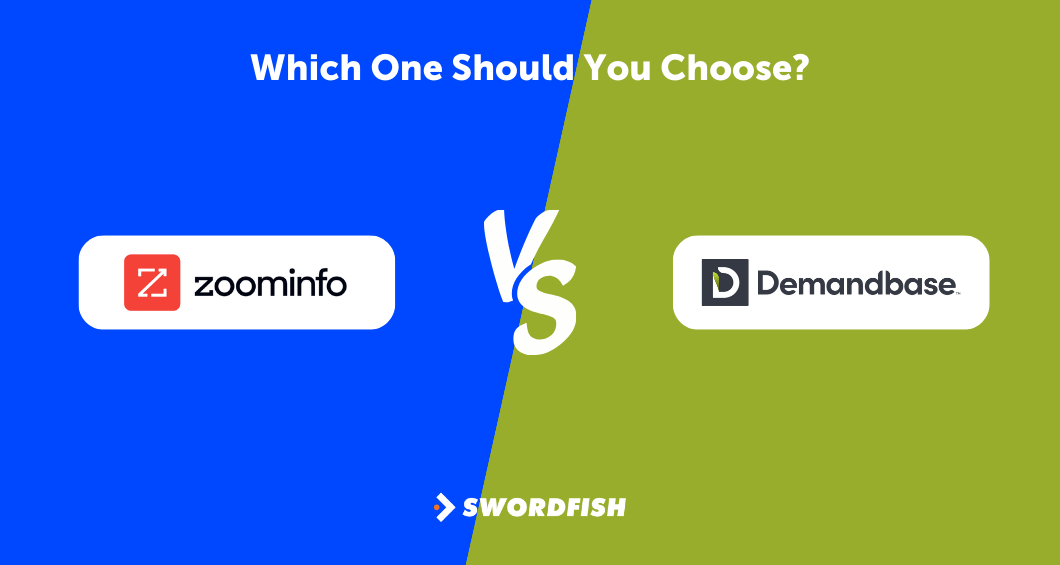
When you’re choosing between ZoomInfo and Demandbase, consider what each offers and its limitations.
ZoomInfo stands out with its large B2B database, giving you detailed information about companies and contacts. It’s great for you if you’re in sales or marketing and need to find leads or research the market.
But, keep in mind, ZoomInfo doesn’t openly share its pricing. You’ll need to contact them to get a quote, which might be a hassle.
Demandbase, meanwhile, is all about Account-Based Marketing (ABM) and B2B advertising. It uses AI to help you target your marketing efforts and gather sales intelligence, which is really useful if ABM is your focus.
However, if you’re new to ABM, you might find there’s a bit of a learning curve with Demandbase.
Ultimately, ZoomInfo is a good fit if you need deep insights into contacts and companies. If ABM and targeted marketing tools are what you’re after, then Demandbase could be the better choice for you.
Swordfish AI: The Best Alternative of ZoomInfo and Demandbase
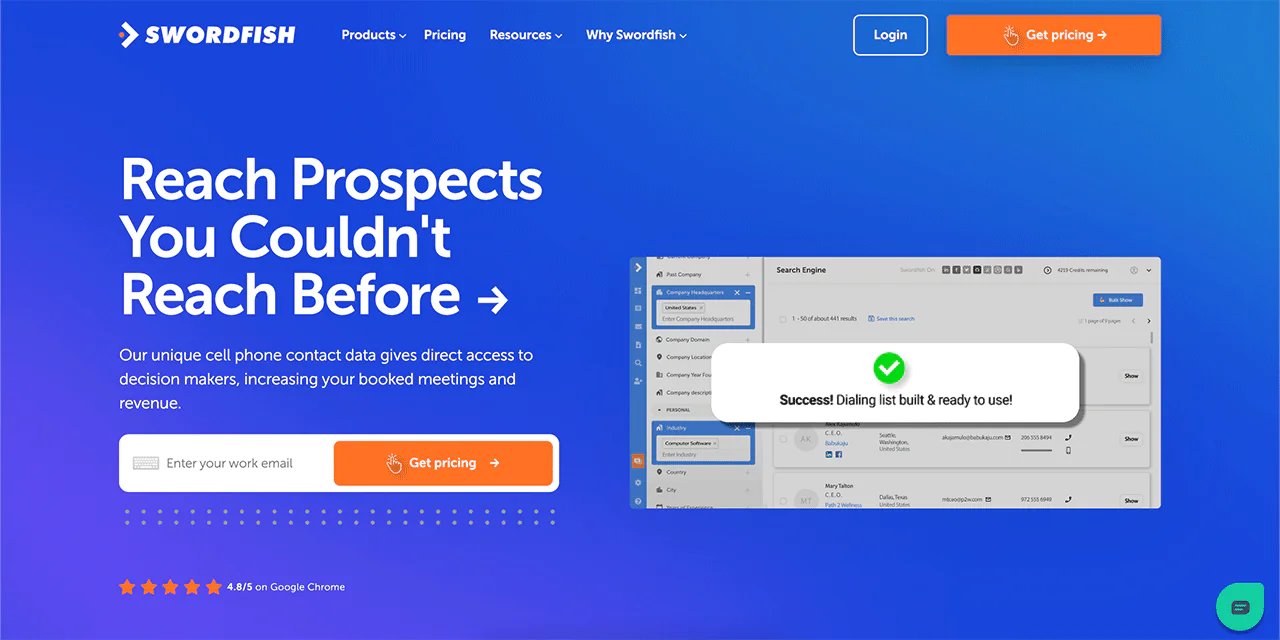
Swordfish AI stands out as a strong choice for B2B intelligence and marketing, similar to ZoomInfo and Demandbase in many ways.
What makes Swordfish AI special is its exclusive cell phone number collection and unique system for verifying these numbers. It’s great for cold calling and reaching out directly.
Plus, with access to over 3.5 billion data profiles, it offers a wealth of information just like ZoomInfo and Demandbase. If you’re looking for a tool that combines ZoomInfo’s wide-ranging contact details and Demandbase’s focus on targeted marketing, Swordfish AI could be the answer.
It brings together special features and a huge amount of data, making it a flexible option for businesses aiming to boost their sales and marketing. Think of Swordfish AI as a combined solution, offering the best aspects of both platforms.
Features of Swordfish AI
Swordfish AI offers several notable features —
-
Prospector
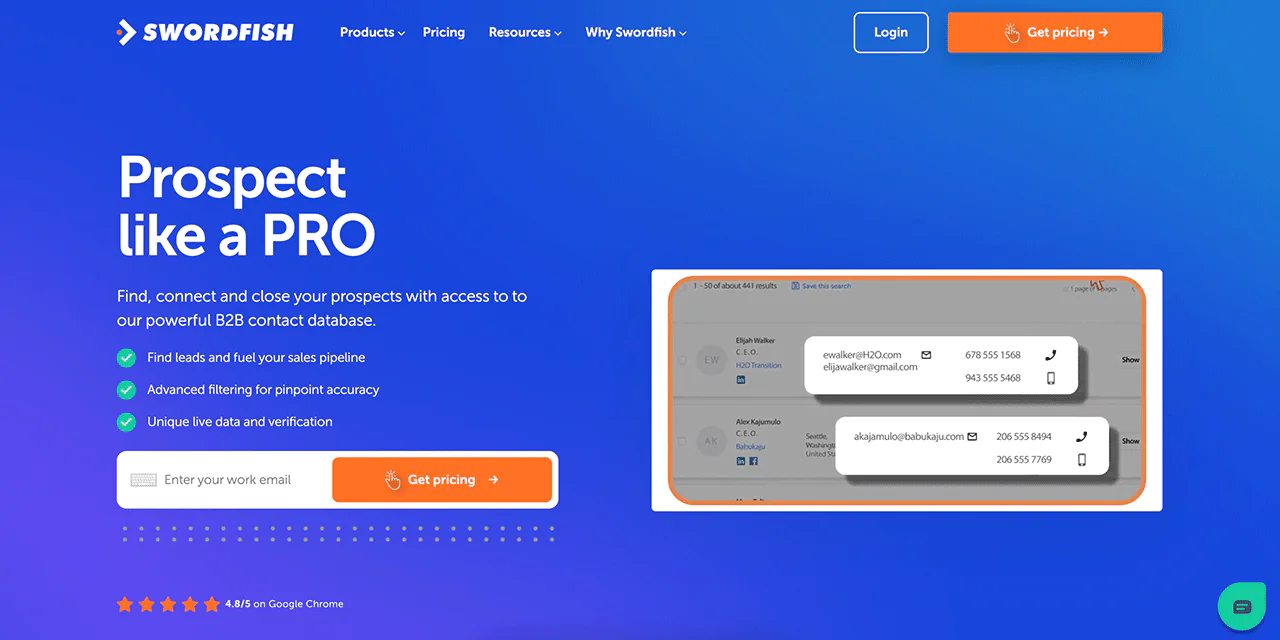
You can easily find and organize leads using the Prospector tool. It’s perfect for building targeted calling or email lists using advanced filters for precise lead generation.
-
API
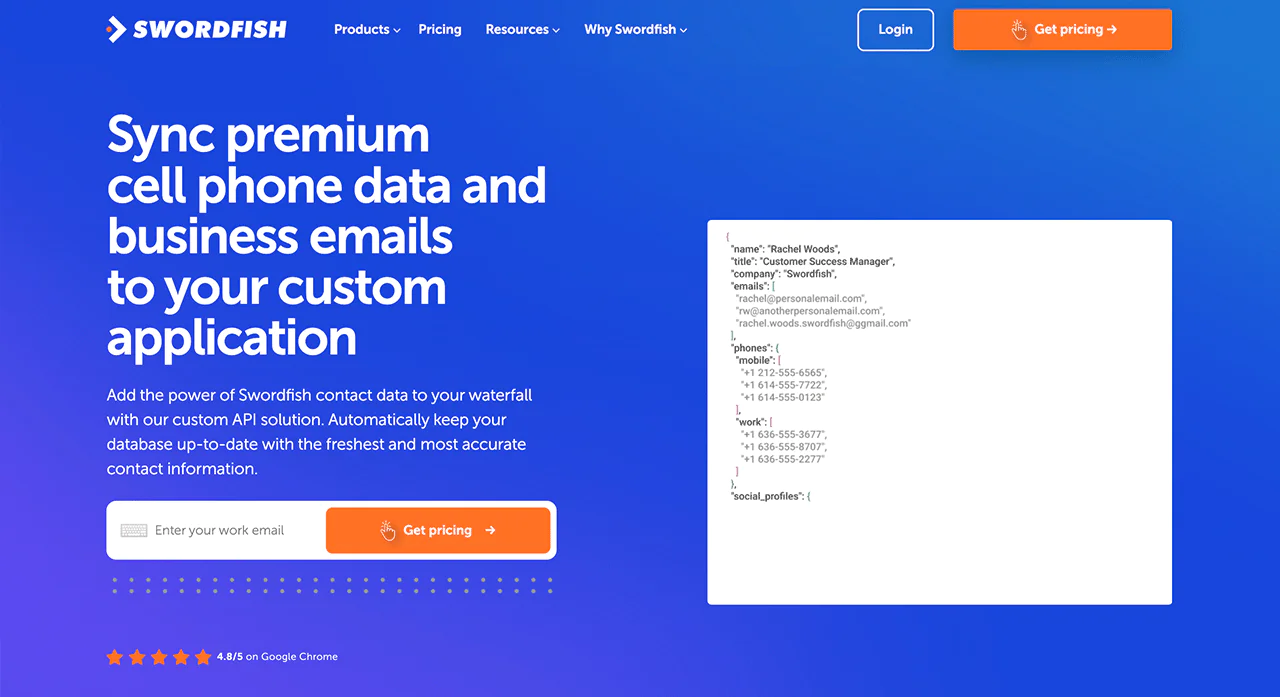
You can integrate Swordfish AI’s API directly into your applications. That way you can improve your existing systems with powerful contact data.
-
File Upload
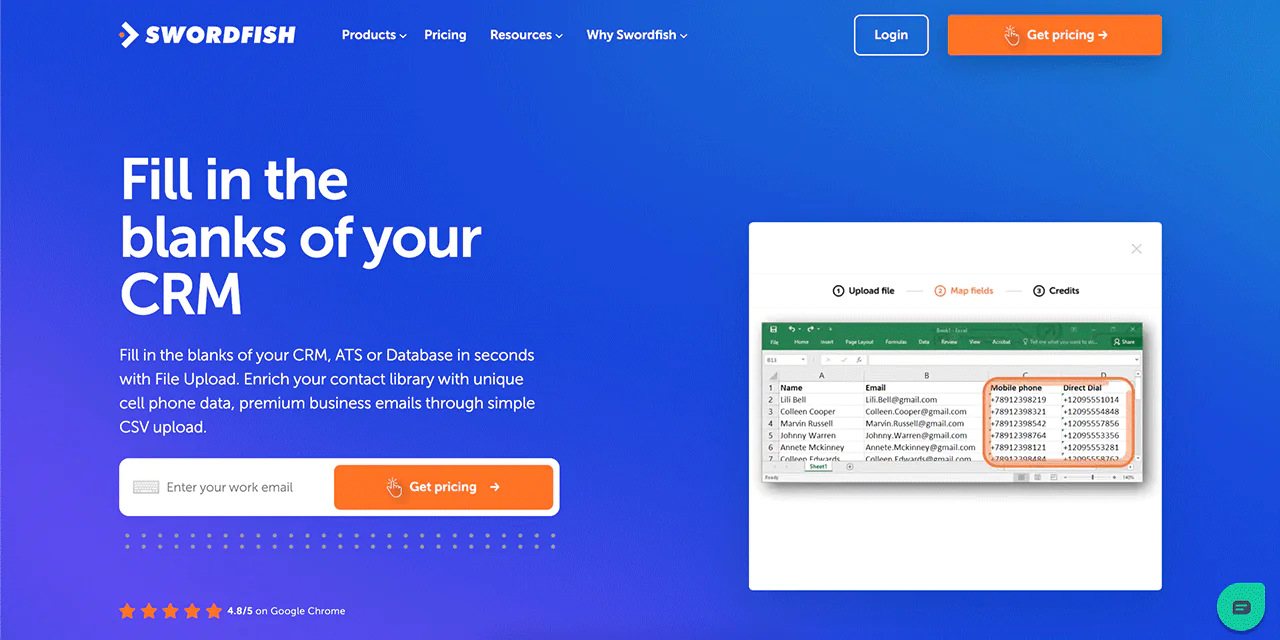
With this feature, you can easily fill in missing contact details in your CRM. Just upload a file, and Swordfish AI will add missing cell phone numbers and emails in seconds.
-
Reverse Search
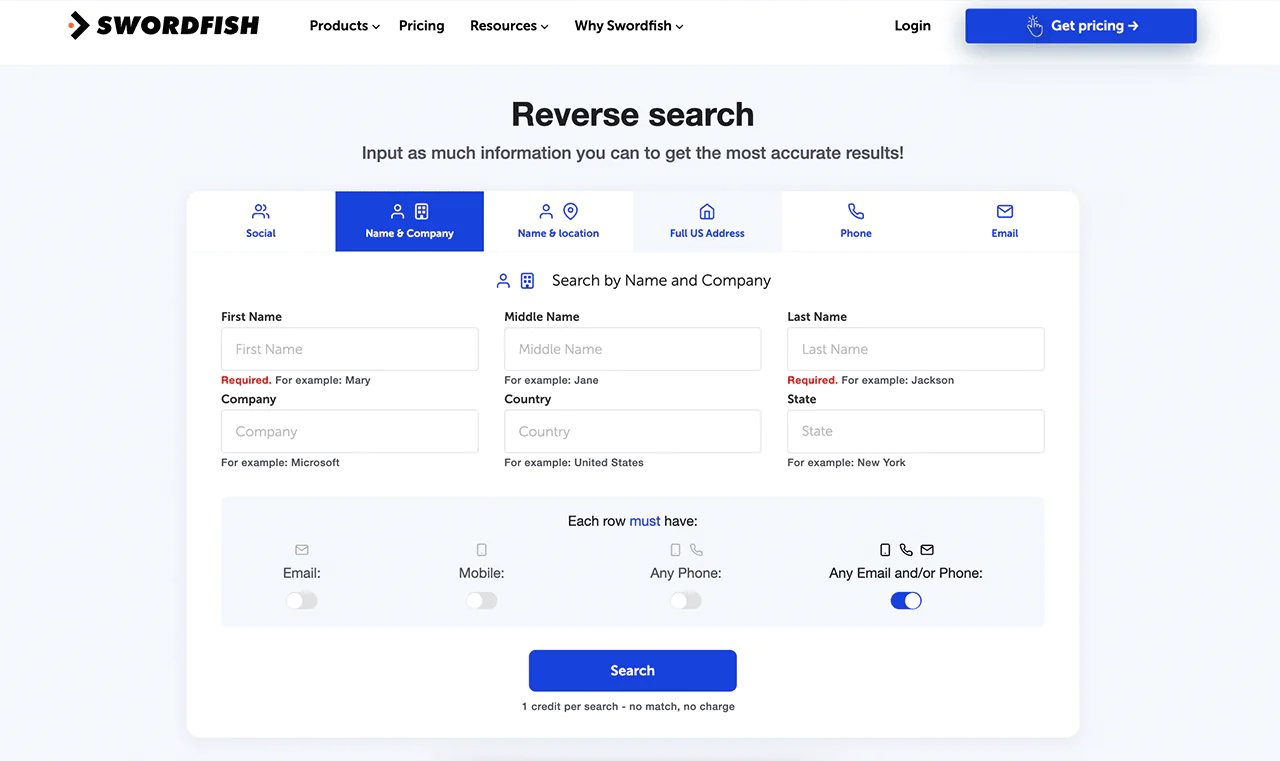
Reverse Search lets you use the information you have to find what you don’t. Enter any combination of name, company, email, phone, or social profile, and Swordfish AI will find the person for you.
-
Chrome Extension
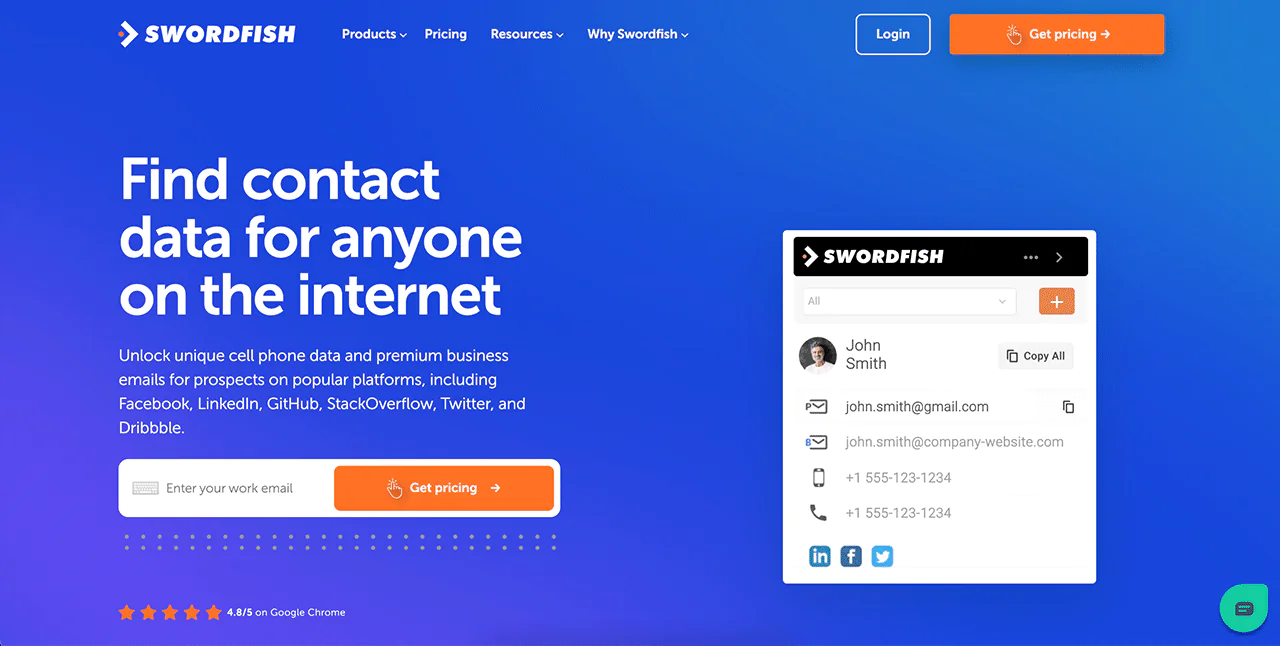
Swordfish AI’s Chrome Extension makes finding contact information on the web effortless. It works across various platforms like LinkedIn, Twitter, and Facebook, providing quick access to unique and verified contact data.
Pricing
Swordfish AI presents flexible pricing plans designed for different needs like marketing, sales, recruitment, or API usage. These plans give you access to accurate emails, direct phone numbers, and mobile contacts to help meet your goals.
Moreover, Swordfish AI offers a complimentary free trial with 500 credits. This trial easily fits into your existing workflow and includes complimentary updates to job titles and company information.
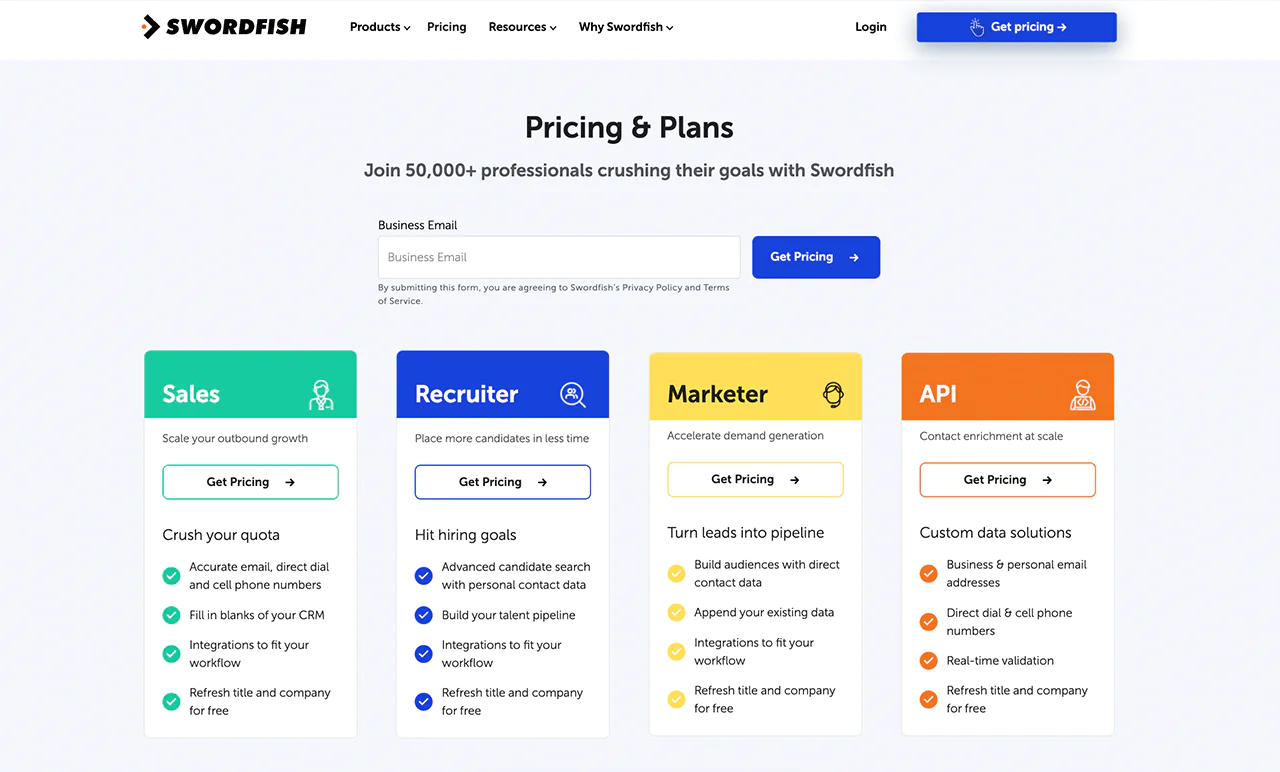
A Comparison Table: ZoomInfo vs Demandbase vs Swordfish AI
When exploring B2B intelligence platforms, you compare the available data ZoomInfo, Demandbase, and Swordfish offers. Here’s a concise comparison to help you understand their differences and similarities in terms of data availability.
|
Features |
ZoomInfo | Demandbase |
Swordfish AI |
|
Data Type |
B2B contacts, company info | ABM-focused B2B data | Cell numbers, emails |
| Data Volume | Over 135 million verified phone numbers and 260 million professional profiles | Over 150 million B2B contacts, and 92 million companies |
Over 3.5 billion profiles |
|
Special Features |
In-depth market research | Targeted ABM strategies | Direct outreach efficiency |
| Integration | Pipedrive, Salesforce, Dynamics 365, Zoho, HubSpot, etc. | Marketo, DRIFT, QUALIFIED, HubSpot, Salesforce, etc. |
Zoho, Salesforce, Bullhorn, Zapier, Outreach, etc. |
|
Pricing Details |
Custom quotes | Online calculator | Customized plans |
| Best For | Lead generation, research | ABM, targeted marketing |
Cold calling, direct contact |
ZoomInfo vs Demandbase vs Swordfish AI: Which One Should You Pick?
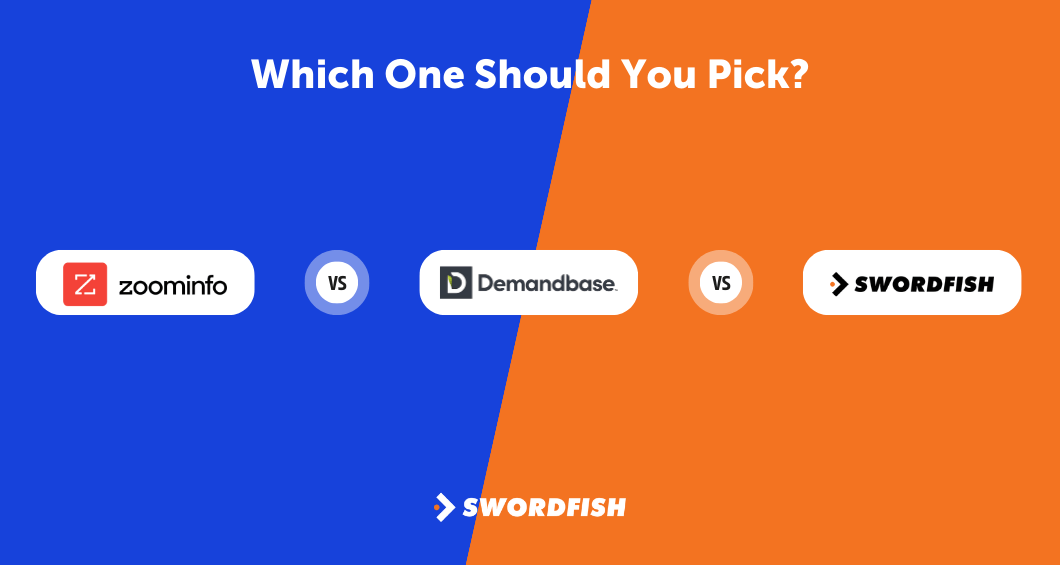
ZoomInfo, Demandbase, and Swordfish AI each bring something unique to the table, fitting different business needs. There’s no single perfect choice, but knowing what each offers helps you find what’s best for you.
ZoomInfo
ZoomInfo is known for its vast B2B contact databases, giving you deep insights into companies and contacts. It’s great if you need detailed info for lead generation or market research.
But, be aware, some ZoomInfo reviews mention that you’ll need to contact them for pricing details. If you’re all about data depth, ZoomInfo is a solid pick.
Demandbase
Demandbase focuses on Account-Based Marketing (ABM) and B2B advertising, using AI to help you target your marketing and sales efforts. It’s a good fit if ABM is central to your strategy. Their Demandbase calculator on the website helps you understand costs better. So, go for Demandbase if ABM is your game.
Swordfish AI
Swordfish AI is a strong choice, especially if you’re looking at Demandbase competitors. It offers precise contact info, including cell numbers and emails, and ensures real-time accuracy.
With a massive database, Swordfish AI combines ZoomInfo’s data reach and Demandbase’s focused approach. If you want a mix of both their strengths, consider Swordfish AI.
Conclusion
When comparing ZoomInfo vs Demandbase, each platform clearly caters to specific needs.
ZoomInfo is great for its broad B2B contact databases, perfect for in-depth research and finding leads. Demandbase, in contrast, excels in Account-Based Marketing (ABM), providing focused strategies for B2B advertising and sales.
If you need thorough data collection and deep market insights, ZoomInfo is a solid option. On the other hand, if ABM aligns more with your goals and you need specialized marketing tools, then Demandbase is your best bet.
But, if you’re on the lookout for a tool that brings together the strengths of both, Swordfish AI is worth considering. It merges ZoomInfo’s detailed contact info with Demandbase’s targeted methods, making it a flexible choice for various business requirements.
FAQs
Is ZoomInfo a safe platform?
Yes, ZoomInfo is completely safe to use. They prioritize security in everything they do, ensuring their database and products meet high safety standards.
How can I pay for ZoomInfo services?
You have several easy options to pay your bill. We accept payments through ACH Debit, credit/debit cards, wire or bank transfers, ACH, EFT, and checks.
What if I find mistakes in Demandbase’s data?
While Demandbase’s AI might not be perfect and can make some errors, it still provides very reliable information. If you spot any mistakes, you should inform them. The more they understand about these errors, the better they can make our future data.

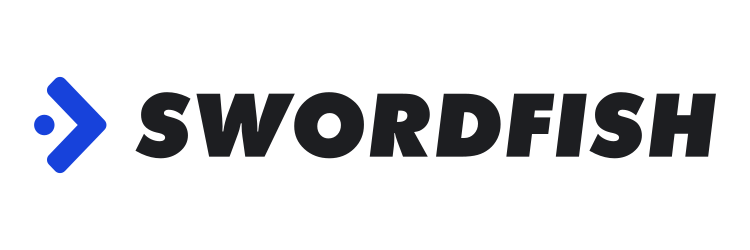
 View Products
View Products


